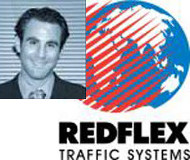3/14/2018
Federal Appeals Court Denies Camera Exec Demand For RewardSeventh Circuit US Court of Appeals rejects $2.3 million reward demand from former Redflex executive vice president.

The former executive vice president of Redflex Traffic Solutions did not find a sympathetic ear in the Seventh Circuit US Court of Appeals on Monday. Aaron M. Rosenberg insisted he was owed $2.3 million as a reward for snitching on his colleagues at the Australian red light camera vendor. A three-judge panel slammed the door on that idea.
"In this classic case of chutzpah, Aaron Rosenberg, a former employee of Redflex Traffic Systems Inc, seeks a share of the proceeds his former employer paid the city of Chicago to settle the case against it arising out of the fraud Rosenberg helped perpetrate," Judge William C. Griesbach wrote for the unanimous court.
The appellate panel was fully satisfied with the "thorough" reasoning of US District Judge John J. Tharp Jr who delivered a stinging rebuke to Rosenberg last year (read opinion). The appellate court recounted how Redflex conspired with John Bills, a Chicago transportation official, and several front groups to expand the photo ticketing program to boost Redflex profits. The bribery scheme ran into trouble when the Chicago Tribune began its investigation.
"On March 13, 2012, the Tribune explained that the city sought bids to replace the red‐light cameras with automated speed cameras and that Resolute Consulting LLC, a consulting firm that worked closely with Redflex, promoted Redflex's bid for the project," Judge Griesbach wrote. "The article reported Bills, who had supervised Redflex's digital automated red light enforcement program contract with the city, had recently retired from his position with the city and now worked for Resolute and the Redflex‐funded Traffic Safety Coalition."
Those newspaper revelations eventually led to the bribery investigation that sent Bills to prison, along with Karen Finley, the head of US operations for Redflex, and bagman Martin O'Malley. O'Malley only served a few months behind bars. Finley is scheduled for release on December 5. Bills is serving time at the federal prison in Pensacola, Florida until 2024.
For turning state's evidence, federal prosecutors let Rosenberg escape accountability despite his central role in orchestrating the bribery scheme. The red light camera executive sought to add to this good fortune by citing Chicago's whistleblower ordinance to claim a reward for his assistance in securing the Finley, Bills and O'Malley convictions. Since the main facts of the case were already public knowledge, the disclosures that Rosenberg provided did not qualify him for a refund, the appellate judges concluded.
"Because he had inside knowledge of the bribery, Rosenberg's allegations likely were not either dependent upon or derived from the public disclosures," Judge Griesbach explained. "But that is no longer the test. Under current law, a relator must present 'genuinely new and material information' beyond what has been publicly disclosed."
Adding a few extra details did not elevate the claim, the court concluded.
"Having read the writing on the wall, Rosenberg divulged information about the bribery scheme in which he was an active and essential participant for nearly ten years. Rosenberg did not voluntarily initiate contact with the office of the inspector general and only provided information once he was contacted as part of the city's investigation... To hold that Rosenberg's disclosure was voluntary simply because no formal legal process required his cooperation in the investigation would frustrate the False Claims Ordinance's essential goal of motivating true volunteers and transform the ordinance into a vehicle for fraudsters to evade responsibility while at the same time profiting further from their crimes."
A copy of the ruling is available in a 200k PDF file at the source link below.


